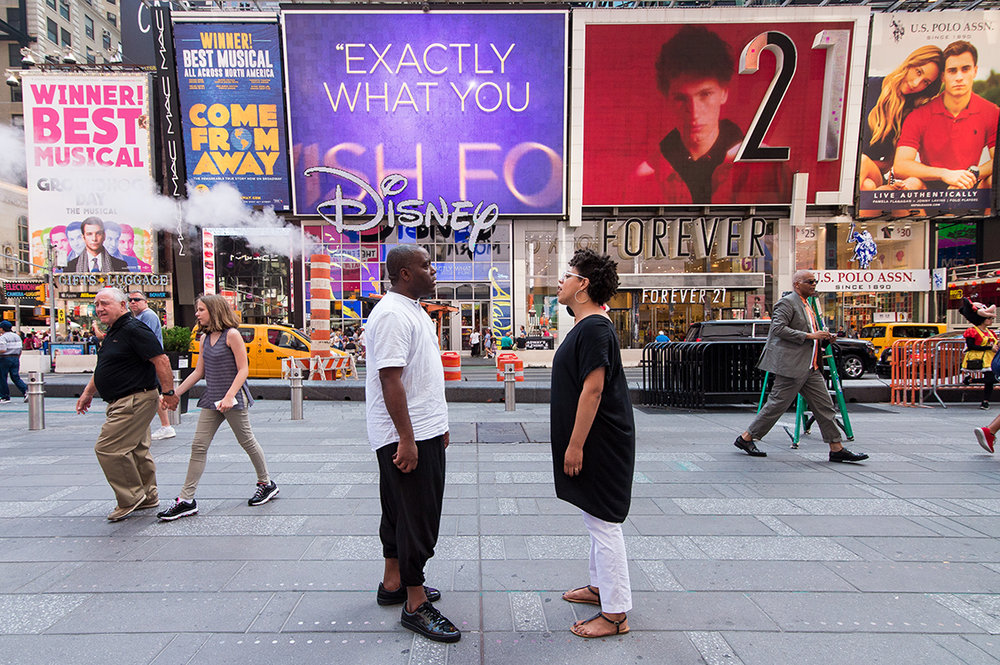EAI Invites: Mendi + Keith Obadike
Electronic Arts Intermix (EAI) is pleased to launch a new public program series, inviting guests to present works of their choosing from the EAI collection. This series is intended to open the archive to new insights, engaging the catalogue from a fresh perspective. EAI Invites will provide a catalyst to consider familiar work from an unexpected angle, or to call attention to artists or works that have a particular significance to the guest. For our first event, Mendi + Keith Obadike will present a selection of "artist-made 'music videos,'" including works by Kit Fitzgerald and John Sanborn, Philip Mallory Jones (Wassa), Bill Viola (Playing Soul Music to My Freckles) and Tony Cokes (2@), among others, followed by an informal conversation with the audience.

|
Thursday, January 10, 2019 7:00 pm Electronic Arts Intermix (EAI) 535 West 22nd Street, 5th Fl. New York, NY 10011 www.eai.org Admission $7, Students $5 Free for EAI Members TICKETS |
Mendi + Keith Obadike are interdisciplinary artists whose sound, text, and participatory installations and media projects engage the general public in provocative exchanges about racial, social, and gendered identity. EAI had the opportunity to work with the artists for Digital Africa, an exhibition organized with the African Film Festival in 2003, for which they produced The Pink of Stealth, an interactive Web and DVD project that explored the relationship of language, color, and class through the vernaculars of fashion, pop culture, and foxhunting.
Exploring the implications of cultural systems in relation to blackness especially, Mendi + Keith’s work extends beyond the purely visual to activate an aural, spatial, and experiential attentiveness in a new media landscape. In a recent Rhizome interview with Aria Dean, speaking about their prescient early net art works Black.Net.Art Actions (2001-03), the artists re-characterized the early Internet as a colonialist enterprise, driven by companies tinged with this association in their names (e.g. Amazon, Internet Explorer, Netscape Navigator). The “bay” of eBay is where one of their most known works was staged. In Blackness for Sale (2001), Keith’s blackness was offered to the highest bidder, reaching a peak bid of $152.50 before the project was pulled/censored by the company. “Some people were arguing that race had less meaning online; we felt, instead, that racial logics were accruing new methods of operating. We noted that in the online environment people use both language and images associated with race to assign value in the marketplace, and we wanted our work to invite meditation and dialogue about that.”
The artists’ public sound art installations, such as the Americana Suites series (2007–16), move the meditation from the virtual to the physical world, combining the emotional impact of African-American music traditions–freedom songs, spirituals, hip hop–with information-driven texts. Big House/Disclosure (2007), the first in this series, was a 200 hour “house” song comprised of public dialogs about slavery, money, music, and architecture. Fit (The Battle of Jericho) was installed as part of Vijay Iyer’s 2016 residency at the Met Breuer and integrated Black Lives Matter online search data with a musical cover of a familiar spiritual to awaken a dormant gallery.
Mendi received a BA in English from Spelman College and a PhD in Literature from Duke University. After working as a Cotsen Postdoctoral Fellow at Princeton University, she became a poetry editor at Fence Magazine and is currently an associate professor in the Department of Humanities and Media Studies at Pratt Institute. Keith received a BA in Art from North Carolina Central University and an MFA in Sound Design from Yale University. He is a professor in the College of Arts and Communication at William Paterson University and serves as digital media editor at Obsidian. Their work has been exhibited at The Studio Museum, New York; MIT/List Visual Art Center, Boston and The Met Breuer, New York, and commissioned by The Yale Cabaret, Whitechapel Art Gallery (London), and The Whitney Museum of Art, among other institutions. Their music has been featured on New York and Chicago public radio, and Juniradio (104.5) in Berlin. Other honors include a Rockefeller New Media Arts Fellowship, Pick Laudati Award for Digital Art, a New York Foundation for the Arts Fellowship in Fiction, and the Louis Comfort Tiffany Biennial Award. They are currently in the group show Programmed: Rules, Codes, and Choreographies in Art, 1965–2018 at the Whitney Museum of American Art and exhibiting their project Utopias: Seeking for a City as artists in residence at the Weeksville Heritage Society in Brooklyn, NY. Mendi and Keith also serve as art advisors to the Times Square Alliance and The Vera List Center for Art and Politics.
About EAI
Electronic Arts Intermix (EAI) is a nonprofit arts organization that fosters the creation, exhibition, distribution, and preservation of moving image art. A New York-based international resource for media art and artists, EAI holds a major collection of over 3,500 new and historical media artworks, from groundbreaking early video by pioneering figures of the 1960s to new digital projects by today’s emerging artists. EAI works closely with artists, museums, schools and other venues worldwide to preserve and provide access to this significant archive. EAI services also include viewing access, educational initiatives, extensive online resources, technical facilities, and public programs such as artists’ talks, screenings, and multi-media performances. EAI’s Online Catalogue is a comprehensive resource on the artists and works in the EAI collection, and features expansive materials on media art’s histories and current practices:
www.eai.org
___________________________________
Electronic Arts Intermix
535 West 22nd Street, 5th Floor
New York, NY 10011
t (212) 337-0680
f (212) 337-0679
___________________________________
This program is made possible in part by public funds from the New York City Department of Cultural Affairs, in partnership with the City Council; and New York State Council on the Arts with the support of Governor Andrew M. Cuomo and the New York State Legislature.







